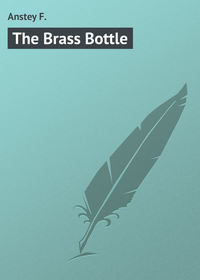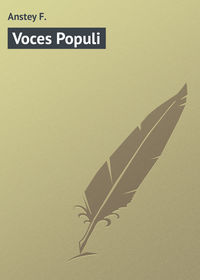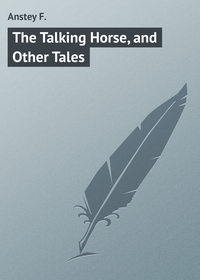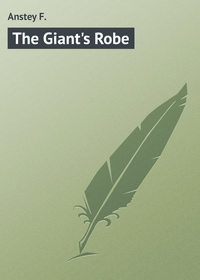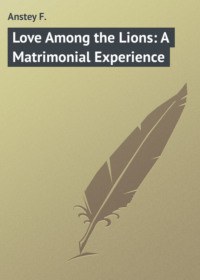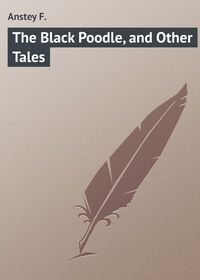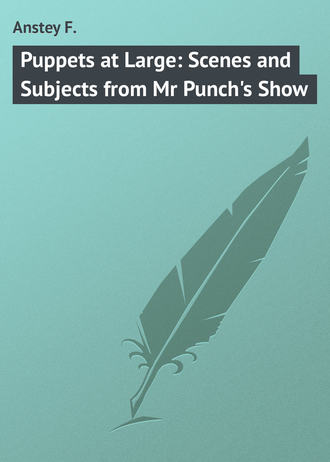
Puppets at Large: Scenes and Subjects from Mr Punch's Show
The L. of F. (making a desperate effort to throw herself into the question). What a very extraordinary thing to be sure. Dear, dear me! No ham and beef shop!
The C. W. It's so indeed, Mum; and what's more, as I daresay you have noticed for yourself, if you 'appen to want a snack o' fried fish ever so, there isn't a place you could go to – leastways, at a moment's notice. Now, 'ow do you explain such a thing as that?
The L. of F. (faintly). I'm afraid I can't suggest any explanation.
A Sententious Man. Fried fish is very sustaining.
[Relapses into silence for remainder of journey.The Eccentric Man. Talking of sustaining, I remember, when we was kids, my father ud bring us home two pennorth o' ches'nuts, and we 'ad 'em boiled, and they'd last us days. (Sentimentally.) He was a kind man, my father (to the L. of F., who bows constrainedly), though you wouldn't ha' thought it, to look at him. I don't know, mind yer, that he wasn't fond of his bit o' booze – (the L. of F. looks out of window) – like the best of us. I'm goin' up to prove his will now, I am – if you don't believe me, 'ere's the probate. (Hands that document round for inspection.) That's all reg'lar enough, I 'ope. (To the L. of F.) Don't give it back before you've done with it – I'm in no 'urry, and there's good reading in it. (Points out certain favourite passages with a very dirty forefinger.) Begin there —that's my name.
[The L. of F. peruses the will with as great a show of interest as she can bring herself to assume.The Eccentric Man. D'ye see that big 'andsome building over there? That's the County Lunatic Asylum – where my poor wife is shut up. I went to see her last week, I did. (Relates his visit in detail to the L. of F., who listens unwillingly.) It's wonderful how many of our family have been in that asylum from first to last. I 'ad a aunt who died cracky; and my old mother, she's very peculiar at times. There's days when I feel as if I was a little orf my own 'ed, so if I say anything at all out of the way, you'll know what it is.
[L. of F. changes carriages at the next station. In the second carriage are two Men of seafaring appearance, and a young Man who is parting from his Fiancée as the L. of F. takes her seat.The Fiancé. Excuse me one moment, Ma'am.
(Leans across the L. of F. and out of the window.) Well, good-bye, my girl; take care of yourself.
The Fiancée (with a hysterical giggle.) Oh, I'll take care o' my self.
[Looks at the roof of the carriage.He (with meaning). No more pickled onions, eh?
She. What a one you are to remember things! (After a pause.) Give my love to Joe.
He. All right. Well, Jenny, just one, for the last. (They embrace loudly, after which the F. resumes his seat with an expression of mingled sentiment and complacency.) Oh (to L. of F.), if you don't mind my stepping across you again, Mum. Jenny, if you see Dick between this and Friday, just tell him as —
[Prolonged whispers; sounds of renewed kisses; final parting as train starts with a jerk, which throws the Finacé upon the L. of F.'s lap. After the train is started a gleam of peculiar significance is observable in the eyes of one of the SeafaringMen, who is reclining in an easy attitude on the seat. His companion responds with a grin of intelligence, and produces a large black bottle from the rack. They drink, and hand the bottle to the Fiancé.
The F. Thankee, I don't mind if I do. Here's wishing you —
[Remainder of sentiment drowned in sound of glug-glug-glug; is about to hand back bottle when the first Seafarer intimates that he is to pass it on. The L. of F. recoils in horror.Both Seafarers. It's wine, Mum!
[Tableau. The Lady of Family realises that the study of third-class humanity has its drawbacks.THE FARMING OF THE FUTURE;
Or, What British Agriculture is Coming toA Car on the Electric Light Railway. Time. – Twentieth CenturyFirst Farmer (recognising Second Farmer). Why, 'tis Muster Fretwail, surelie! didn't see it was you afore. And how be things gettin' along with you, Sir, eh?
Farmer Fretwail (lugubriously). 'Mong the middlin's, Muster Lackaday; 'mong the middlin's! Nothen doin' just now – nothen 't all!
Third Farmer (enviously). Well, you hevn't no call fur to cry out, neighbour. I see you've got a likely lot o' noo 'oardins comin' up all along your part o' the line. I wish mine wur arf as furrard, I know thet!
F. Fretwail. Ah, them "Keep yer 'air on"'s, you mean, Ryemouth. I don't deny as they was lookin' tidy enough a week back. But just as I was makin' ready fur to paint up "Try it on a Billiard Ball," blamed if this yere frost didn't set in, and now theer's everything at a standstill, wi' the brushes froze 'ard in the pots!
F. Ryemouth. 'Tis the same down with me. Theer's a acre o' "Bunyan's Easy Boots" as must hev a noo coat, and I cann't get nothen done to 'en till the weather's a bit more hopen like. Don' keer 'ow soon we hev a change, myself, I don't!
F. Lackaday. Nor yet me, so long as we don't 'ave no gales with it. Theer was my height acre pasture as I planted only las' Candlemas wi' "Roopy's Lung Tonics" – wunnerful fine and tall they was, too – and ivery one on 'en blowed down the next week!
F. Fretwail. Well I 'ope theer wun't be no rain, neither, come to that. I know I had all the P's of my "Piffler's Persuasive Pillules" fresh gold-leaved at Michaelmas, and it come on wet directly arter I done it, and reg'lar washed the gilt out o' sight an' knowledge, it did. Theer ain't no standin' up agen rain!
F. Ryemouth. I dunno as I wouldn't as lief hev rain as sun. My "Hanti-Freckle Salves" all blistered up and peeled afore the summer was 'ardly begun a'most.
F. Lackaday. 'Tis a turr'ble hard climate to make 'ead against, is ourn. I've 'eard tell as some farmers are takin' to they enamelled hiron affairs, same as they used to hev when I wur a lad. I mind theer wur a crop o' "Read Comic Cagmag" as lingered on years arter the paper itself. Not as I hold with enamelling, myself – 'tain't what I call 'igh farmin' – takes too much outer the land in my 'pinion.
F. Fretwail. Aye, aye. "Rotation o' boards." Say, "Spooner's Sulphur Syrup" fur a spring crop, follered with some kind o' soap or candles, and p'raps cough lozengers, or hembrocation, or bakin' powder, if the soil will bear it, arterwards – that's the system I wur reared on, and there ain't no better, 'pend upon it!
F. Ryemouth. I tell 'ee what 'tis; it's time we 'ad some protection agen these yere furrin advartisements. I was travellin' along the Great Northern t'other day, an' I see theer wos two or three o' them French boards nigh in ivery field, a downright shame and disgrace I call it, disfigurin' the look of the country and makin' it that ontidy – let alone drivin' honest British boards off the land. Government ought to put a stop to it; that's what I say!
F. Lackaday. They Parliment chaps don't keer what becomes of us poor farmers, they don't. Look at last General Election time. They might ha' given our boards a turn; but not they. Most o' they candidates did all their 'tisin' with rubbishy flags and balloons – made in Japan, Sir, every blamed one o' them! And they wonder British Agriculture don't prosper more!
F. Ryemouth. Speaking o' queer ways o' hadvertisin', hev any of ye set eyes on that farm o' young Fullacrank's? Danged if ever I see sech tomfool notions as he's took up with in all my born days.
F. Fretwail. Why, what hev he been up to now, eh?
F. Ryemouth. Well, I thought I shud ha' bust myself larfin' when I see it fust. Theer ain't not a board nor a sky sign; no, nor yet a 'oarding, on the 'ole of his land!
F. Lackaday. Then how do he expect to get a profit out of it? – that's what I want to year.
F. Ryemouth. You'll 'ardly credit it, neighbours, but he's been buryin' some o' they furrin grains, hoats and barley, an' I dunno what not, in little holes about his fields, so as to make the words, "Use Faddler's Non-Farinaceous Food" – and the best of it is the darned young fool expecks as 'ow it'll all sprout come next Aperl – he do indeed, friends!
F. Fretwail. Flying in the face o' Providence, I calls it. He must ha' gone clean out of his senses!
F. Lackaday. Stark starin' mad. I never heerd tell o' such extravagance. Why, as likely as not, 'twill all die off o' the land afore the year's out – and wheer wull he be then?
F. Ryemouth. Azactly what I said to 'en myself. "You tek my word for it," I sez, "'twun't never come to no good. The nateral crop for these yere British Hiles," I told 'en, "is good honest Henglish hoak an' canvas," I sez, "and 'tain't the action of no sensible man, nor yet no Christian," sez I, "to go a-drillin' 'oles and a-droppin' in houtlandish seeds from Canada an' Roosha, which the sile wasn't never intended to bear!"
Farmers Fretwell and Lackaday. Rightly spoke, neighbour Ryemouth, 'twas a true word! But theer'll be a jedgment on sech new-fangled doin's, and, what's moor, you and I will live fur to see it afore we're very much older!
[They all shake their heads solemnly as scene closes in.A DIALOGUE ON ART
(A Study in Spirits and Waters.)The Smoke-room of a Provincial Hotel. Time – Towards midnight. Characters – Mr. Luceslipp-Bletheron, a middle-aged Art Patron and Dilettante. He has arrived at his third tumbler of whiskey and water, and the stage at which a man alludes freely before strangers to his "poor dear father." Mr. Milboard, a Painter, on a sketching tour. He is enduring Mr. L. – B. with a patience which will last for just one more pipe. First Commercial, who considers Mr. L. – B. a highly agreeable and well-informed gentleman, and is anxious to be included in his audience. Second Commercial, who doesn't intend to join in the conversation until he feels he can do so with crushing effect.
Mr. Luceslipp-bletheron. Yes, I assure you, I never come acrosh a David Cox but I say to myself, "There'sh a Bit!" (Here he fixes his eye-glass, sips whiskey and water, and looks at Mr. Milboard as if he expected him to express admiration at this evidence of penetration. The only tribute he extorts, however, is a grunt.) Now, we've a Cornelius Janssen at home. Itsh only hishtory is – my dear father bought it. He was an artist himself, painted a bit, travelled man, an' all that short o' thing. Well, he picked it up for ten pounds!
First Commercial (deferentially). Did he reelly now? A Johnson for ten pounds! Did he get a warranty with it, Sir?
Mr. L. – B. (after bringing the eye-glass to bear on the intruder for a second). Then I've a Mieris – at leasht, shome clever f'ler painted it, and it'sh a pleashure to look at it, and you can't get over that, can you?
Mr. Milboard. I don't intend to try to get over it.
Mr. L. – B. You're qui' right. Now I'm the lasht man in the world to shwagger; shtill, I'm goin' to ashk you to lemme have my lil' shwagger now. I happened to be at Rome shor' time ago, and I met Middleman there. We had our lil' chat together and what not – he'sh no pershonal friend o' mine. Well; I picked up a lil' drawing by a Roman chap; worth nothing more than what I got it for, or anything, as you may shay. Middleman had the whole run of this chap's studio. I saw this drawing – didn't care mush about it – but thought it wash a gem, and gave the modesh shum of a hundred an' fifty lire for it. Put it in my portmanteau between a couple o' shirts —
First Comm. (still pining for notice). When you say shirts, Sir, I presume you mean clean ones?
Mr. L. – B. No man with the shlightest feelin' or reverence for Art would put sush a queshtion! (The First Comm. collapses.) Between a couple of – (underlining the word) Shirts, and brought it home. Now I'm comin' to my point. One afternoon after my return, I wash walking down Bond Street, when I saw a sketch exhibited in a window by the shame f'ler. I went in and shaid, "What are you asking for thish? Mind I don' wanter buy it; ashk me any price yer like!" And they shaid forty guineash.
Mr. Milb. Apparently they availed themselves of your permission, and did ask you any price they liked.
Mr. L. – B. No doubt; but wait till I've done. I saw another – a finished drawing not qui' so good as mine, there. Then I shaid to them quietly, "Now, look here, why don' you go an' buy 'em for yourshelves in the artist's own shtudio?" It shtruck me as sho odd, a man like Middleman, being there, and having the pick, shouldn' buy more of 'em!
Mr. Milb. Wasn't worth his while; he can't buy everything!
Mr. L. – B. (after considering this impartially with some more whiskey). No; your ansher is a very good one, and a very fair one. He can't buy everything. I did pick, however, an' I gorrit. I said to him, "How mush?" an' he tol' me, and there wash an end of it, do you shee?
Mr. Milb. It's the ordinary course of business, isn't it?
Mr. L. – B. Egshackly. But how few do it! Now, I'll tell you 'nother shtory 'bout my poo' dear father. He came 'pon a sculpture in a curioshity shop; it wash very dirty and used up, but my dear father saw it was worth shpotting, and a thing to be shpotted, and sho he put hish finger on it!
First Comm. (undaunted by past failure). And was it antique, Sir?
Mr. L. – B. That'sh more'n I can tell you; it wash very dirty, at any rate, and he only gave fifty guineash for it. Wasn't a great shum —
First Comm. (encouraged by his affability). No, indeed; a mere nothing, so to speak, Sir!
Mr. L. – B. (annoyed). Will you have the goodnesh to lemme finish what I was telling thish gentleman? When my poo' father got that busht home, it was the mos' perfect likenesh o' Napoleon!
Mr. Milb. Ha! puts me in mind of the old story of the man who picked up a dingy panel somewhere or other, took it home, cleaned it, and found a genuine Morland; went on cleaning and discovered an undoubted Rembrandt; cleaned that, and came to a Crivelli; couldn't stop, kept on cleaning, and was rewarded by a portrait of George the Fourth!
First Comm. (deeply impressed). And all of them genuine? How very extraordinary, to be sure!
Mr. L. – B. (wagging his head sapiently). I could tell you shtranger things than that. But as I was shaying, here was this busht of Napoleon, by some French chap – which you would tell me was against it.
Mr. Milb. Why? The French are the best sculptors in the world.
Mr. L. – B. The Frensh! I can not bring myshelf to believe that, if only for thish shimple reashon, they haven't the patiensh for it.
First Comm. So I should have said. For my own part – not knowing much about it, very likely – I should have put the Italians first.
Mr. Milb. If you are talking of all time —
First Comm. (feeling at last at his ease). I should say, even now. Why, there was a piece of statuary in the Italian Exhibition at Earl's Court some years back that took my fancy and took my wife's fancy very much. It was a representation in marble of a 'en and chickens, all so natural, and with every individual feather on the birds done to such a nicety – !
Mr. Milb. I was hardly referring to the skill with which the Italians carve – ah —poultry.
Mr. L. – B. Ridic'lous! Great mishtake to talk without unnershtanding shubject. (The First Commercial retires from the room in disorder.) One thing I should like to ashk is thish. Why are sculptors at present day so inferior to the antique? Ishn't the human form divine ash noble and ash shymmetrical ash formerly? Why can't they reproduce it then?
Mr. Milb. You must first find your sculptor. Providence doesn't see fit to create a Michael Angelo or a Praxiteles every five minutes, any more than a Shakspeare.
Mr. L. – B. (wavering between piety and epigram). Thank the Lord for that! Now there'sh Florensh. Shome of us who have had the run there – well, there you see all the original thingsh – all the originalsh. And yet, if you'll believe me (dreamily), with all my love and charm for Art, gimme the Capitoline Venush living and breathing in flesh and blood, Sir, not in cold lifelesh marble!
Mr. Milb. That of course is a matter of taste. But we are talking about Art, not women.
Mr. L. – B. (profoundly). Unforsh'nately, women are the shubjects of Art. You've got to find out your client's shtyle of Art firsht, and then carry it out in the besht possible manner.
Mr. Milb. (rising, and knocking his pipe out). Have I? But I'm going to bed now, so you'll excuse me.
Mr. L. – B. (detaining him). But look here again. Take the Louvre. (As Mr. Milboard disclaims any desire to take it.) Now, nobody talksh about the Gallery there, and yet, if you only egshemp the thingsh that are rude and vulgar, and go quietly roun' —
Second Commercial (who sees a Socratic opening at last). Might I ask you, Sir, to enumerate any pictures there, that, in your opinion, are "rude and vulgar"?
[Mr. Milboard avails himself of this diversion to escape.Mr. L. – B. In the Grand Gallery of the Louvre there'sh an enormous amount of shtuff, as everybody who'sh an artisht and a lover of Art knowsh. If I had a friend who wash thinking of going to the Louvre (here he looks round vaguely for Mr. Milboard), I should shay to him, "Do you care about pictursh at all? If you don't, don't borrer yourshelf 'bout it. If you do, drop in shome day with Me, and I'll give you a hint what to shee." (As he cannot make out what has become of Mr. Milboard, he has to content himself with the Second Commercial.) If you were my boy, I should shay to you —
Second Comm. (at the door). Pardon me for remarking that, if I was your boy, I should probably prefer to take my own opinion. (With dignified independence.) I never follow other persons' taste in Art!
[He goes out as the Smoke-room Page enters.Mr. L. – B. (hazily with half-closed eyes). If you wash my boy, I should shay to you, very quietly, very sherioushly, and without 'tempting to dictate – (Perceives that he is addressing the Page.) Jus' bring me 'nother glash whiskey an' warrer.
[He is left sitting.THE OLD LOVE AND THE NEW
A ContrastThe Stables at Saddlesprings, the Wheelers' Country House near Bykersall. Miss Diana's Horse Bayard discovered in his Stall.
Bayard (talking to himself, as is the habit of some horses when alone). I can't make it out. She's here. All the family came down yesterday – I heard the omnibus start for the station to meet them. And yet she hasn't sent for me; hasn't even been near me! She always used to rush in here and kiss me on the nose the very first – She's ill – that's it of course – sprained her fetlock or something. If she was well, she'd have had me saddled as soon as she'd had her morning feed, and we'd have gone for a canter together somewhere… I hope she'll get well soon. I'm sick of being taken out by the stable-man; he's so dull – no notion of conversation beyond whistling! Now, Miss Diana would talk to me the whole way… Perhaps her hands and seat might have been – But what did that matter? I liked to feel she was on my back, I liked the sound of her pretty voice, and the touch of her hand when she patted me after her ride… (He pricks his ears.) Why, that's her voice outside now! She's all right, after all. She's coming in to see me!.. I knew she couldn't have forgotten!
Miss Diana's Voice (outside). Yes, you might put it in here for the present, Stubbs. I suppose it will be quite safe?
Stubbs' Voice. Safe enough, Miss, there's plenty o' empty stalls this side. Nothing in 'ere just now, except —
Miss D.'s Voice. Very well, then. Just wipe some of the dust off the mud-guards, because I shall want it again after lunch. And mind you don't scratch the enamel taking it in.
Stubbs. Very good, Miss. I'll be keerful.
[Miss Diana's steps die away upon the cobbles.Bayard (to himself). She's gone – without even asking after me! What has she been out in – a bath chair? I'm sure she must be ill.
Stubbs (to the Bicycle, as he wheels it in). 'Ere, steady now, 'old up, can't ye? And keep that blarsted near pedal o' yourn off o' my enamel. Blest if I wouldn't rather rub down arf a dozen 'unters nor one o' them yere bloomin' bi-cycles. I know where I am with a 'orse; but these 'ere little, twisty, spidery wheels – Come over, will ye. I'll lean ye up agen 'ere till I've 'ad my dinner.
[He places the machine against a partition next to Bayard's stall, and goes out.Bayard (to himself, as he inspects his neighbour with the corner of his eye). It's not a bath-chair; it's one of these bicycles. It must be a sort of animal, I suppose, or Stubbs wouldn't have spoken to it. I should like to ask it one or two questions. (He gets his neck over the partition, and breathes gently through his nostrils upon the handle-bars.) Excuse me, but do you understand horse-language at all?
The Bicycle (answering by a succession of saddle-creaks). Perfectly. I'm a kind of horse myself, I believe, only greatly improved, of course. Would you mind not breathing on my handle-bars like that? It tarnishes the plating so. The saddle is the seat of my intelligence, if you will kindly address your remarks here.
Bayard. I beg your pardon. I will in future. I don't creak myself, but I've been closely connected with saddles ever since I was a two-year-old, so I can follow you fairly well. Didn't I hear my mistress's voice outside just now?
The Bicycle. No; my mistress's, Miss Diana's. I'd just taken her out for a short spin – not far, only fifteen miles or so.
Bayard. Then, she – she's quite well?
The Bicycle. Thanks, she's pedalling pretty strong just now. I'm going out with her again this afternoon.
Bayard. Again! You will have had a hard day of it altogether, then. But I suppose you'll get a day or two's rest afterwards? I know I should want it.
The Bicycle. Bless you, I never want rest. Why, I've been forty miles with her, and come home without clanking a link! She was knocked up, if you like – couldn't go out for days!
Bayard. Ah, she was never knocked up after riding me!
The Bicycle. Because – it's no fault of yours, of course, but the way you've been constructed – you couldn't go far enough to knock anybody up. And she doesn't get tired now, either. I'm not the kind of bicycle to boast; but I've often heard her say that she much prefers her "bike" (she always calls me her "bike" – very nice and friendly of her, isn't it?) to any mere horse.
Bayard. To any mere horse! And does she – give any reasons?
The Bicycle. Lots. For one thing, she says she feels so absolutely safe on me; she knows that, whatever she meets, I shall never start, or shy, or rear, or anything of that sort.
Bayard. I don't remember playing any of those tricks with her, however hard she pulled the curb.
The Bicycle. Then she says she never has to consider whether any distance will be too much for me.
Bayard. As for that– But the longer I was out with her, the better I was pleased; she might have brought me home as lame as a tree all round, and I shouldn't have cared!
The Bicycle. Perhaps not. But she would; so inconvenient, you see. Now my strong point is, I can't go lame – in good hands, of course, and she knows exactly how to manage me, I will say that for her!
Bayard. Does she give you carrots or sugar after a ride? she did me.
The Bicycle (with a creak of contempt). Now what do you suppose I could do with sugar or a carrot if I had it? No, a drop or two of oil now and then is all I take in the way of sustenance. That's another point in my favour, I cost little or nothing to keep. Now, your oats and hay and stuff, I daresay, cost more in a year than I'm worth altogether!


